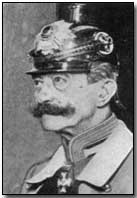Primary Documents - Belgian Women's Societies on Germany's Policy of Deporting Belgians to Germany, 18 November 1916
 Reproduced below is the
text of a letter sent by Belgian women's societies to the U.S. Ambassador to
Belgium, Brand
Whitlock, on 18 November 1916. The women's societies wrote to
register their protest against Germany's policy of deporting unemployed men
from occupied Belgium to Germany in order to support the German war effort.
Reproduced below is the
text of a letter sent by Belgian women's societies to the U.S. Ambassador to
Belgium, Brand
Whitlock, on 18 November 1916. The women's societies wrote to
register their protest against Germany's policy of deporting unemployed men
from occupied Belgium to Germany in order to support the German war effort.
The labour unions' protest was supported by the renowned Roman Catholic Archbishop of Malines, Cardinal Mercier. Click here to read the text of a protest issued by Cardinal Mercier in November 1916. Click here to read the text of a similar appeal issued by Belgian labour unions.
Appeal of Belgian Women's Societies Sent to U.S. Ambassador to Belgium, 18 November 1916
From the depths of our well of misery our supplication rises to you.
In addressing ourselves to you, we denounce to your Government, as well as to our sisters, the women of the nation which you represent in our midst, the criminal abuse of force of which our unhappy and defenceless people is a victim.
Since the beginning of this atrocious war we have looked on impotently and with our hearts torn with every sorrow at terrible events which put our civilization back into the ages of the barbarian hordes.
Mr. Minister, the crime which is now being committed under your eyes, namely, the deportation of thousands of men compelled to work on enemy soil against the interests of their country, can not find any shadow of excuse on the ground of military necessity, for it constitutes a violation by force of a sacred right of human conscience.
Whatever may be the motive it can not be admitted that citizens may be compelled to work directly or indirectly for the enemy against their brothers who are fighting.
The Convention of The Hague has consecrated this principle.
Nevertheless, the occupying power is forcing thousands of men to this monstrous extremity, which is contrary to morals and international law, both these men who have already been taken to Germany and those who tomorrow will undergo the same fate, if from the outside, from neutral Europe and the United States, no help is offered.
Oh! The Belgian women have also known how to carry out their duty in the hour of danger; they have not weakened the courage of the soldiers of honour by their tears.
They have bravely given to their country those whom they loved... The blood of mothers is flowing on the battlefields.
Those who are taken away today do not go to perform a glorious duty. They are slaves in chains who, in a dark exile, threatened by hunger, prison, death, will be called upon to perform the most odious work-service to the enemy against the fatherland.
The mothers can not stand by while such an abomination is taking place without making their voices heard in protest.
They are not thinking of their own sufferings, their own moral torture, the abandonment and the misery in which they are to be placed with their children.
They address you in the name of the inalterable rights of honour and conscience.
It has been said that women are "all powerful suppliants." We have felt authorized by this saying, Mr. Minister, to extend our hands to you and to address to your country a last appeal.
We trust that in reading these lines you will feel at each word the unhappy heartbeats of the Belgian women and will find in your broad and humane sympathy imperative reasons for intervention.
Only the united will of the neutral peoples energetically expressed can counterbalance that of the German authorities.
This assistance which the neutral nations can and, therefore, ought to lend us, will it be refused to the oppressed Belgians?
Source: Source Records of the Great War, Vol. IV, ed. Charles F. Horne, National Alumni 1923
"Bellied" was a term used to describe when a tank's underside was caught upon an obstacle such that its tracks were unable to grip the earth.
- Did you know?
